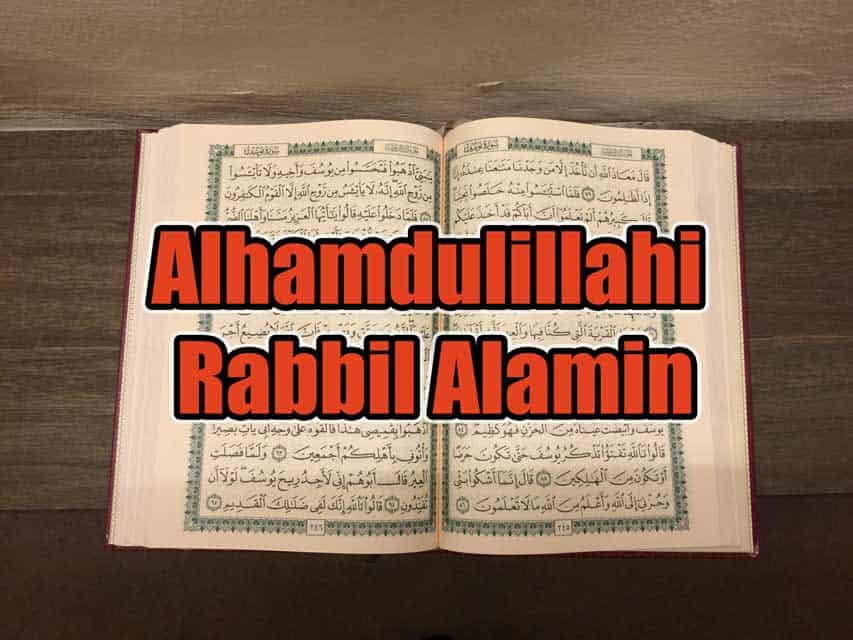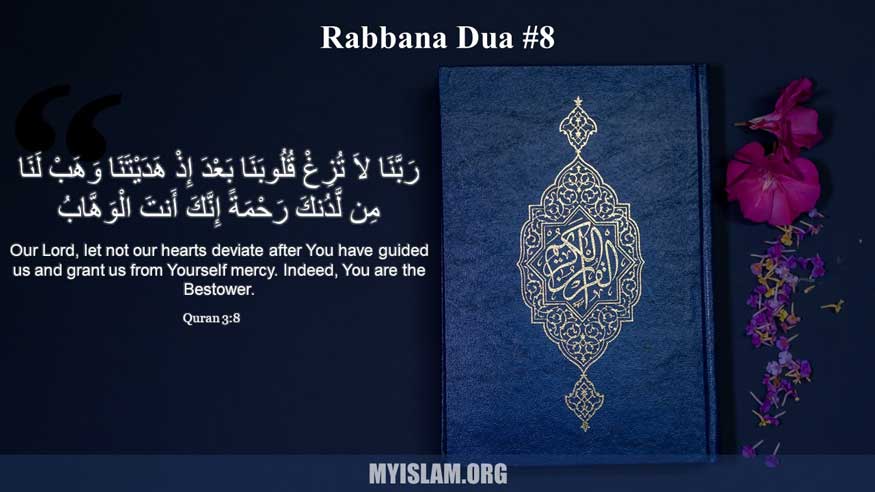Abu Sa’id Ar-Rafi bin Al-Mu’alla (May Allah be pleased with him) reported:
The Messenger of Allah (ﷺ) said, “Shall I teach you the greatest Surah in the Qur’an before you leave the mosque?” Then he (ﷺ), took me by the hand, and when we were about to step out, I reminded him of his promise to teach me the greatest Surah in the Qur’an. He (ﷺ) said, “It is ‘Alhamdu lillahi Rabbil ‘Alamin (i.e., Surat Al-Fatihah) which is As-Sab’ Al-Mathani (i.e., the seven oft- repeated Ayat) and the Great Qur’an which is given to me.”
Reference: Riyad As Salihin, Arabic/English Book 9, Hadith 1009
What is the meaning of Alhamdulillahi Rabbil Alamin?
The literal translation of the phrase Alhamdulillahi rabbil Alamin is “Praise be to Allah, the Lord of the Universe.” This comes from the second verse of Surah Fatiha, the first chapter of the Quran.
This is an important saying for a Muslim and is repeated multiple times everyday. It can be said as dhikr for the sake of worshiping Allah but it’s commonly said during the salat.
Other ways it’s commonly written:
- alhamdu lillahi rabbil alamin
- alhamdulillah rabbil alamin
- alhamdulillahi rabbil alamin
- alhamdulillahirobbil alamin
alhamdulillahi rabbil alamin in arabic
In Arabic, alhamdulillahi rabbil alamin is written as,
الْحَمْدُ لِلَّهِ رَبِّ الْعَالَمِينَ
Hadith on Verse 2 of Surah Fatiha:
Abu Hurairah reported the Messenger of Allah (ﷺ) as saying:
الْحَمْدُ لِلَّهِ رَبِّ الْعَالَمِينَ
All praise be to Allah, the Lord of the Universe” (1) is the epitome or basis of the Qur’an, the epitome or basis of the Book, and the seven oft-repeated verses.
Grade: Sahih (Al-Albani)
Sunan Abi Dawud Book 8, Hadith 42
English translation: Book 8, Hadith 1452
Here is a Tafsir of this Ayat from Abul A’la Maududi from tafheem-ul-Quran regarding ayat 2 of Surah Fatiha:
As we have already explained, the character of this surah is that of a prayer. The prayer begins with praise of the One to whom our prayer is addressed. This indicates that whenever one prays one ought to pray in a dignified manner. It does not become a cultivated person to blurt out his petition.
Refinement demands that our requests should be preceded by a wholehearted acknowledgement of the unique position, infinite benevolence and unmatched excellence of the One to Whom we pray. Whenever we praise someone, we do so for two reasons. First, because excellence calls for praise, irrespective of whether that excellence has any direct relevance to us or not. Second, we praise one who, we consider to be our benefactor; when this is the case our praise arises from a deep feeling of gratitude.
God is worthy of praise on both counts. It is incumbent on us to praise Him not only in recognition of His infinite excellence but also because of our feeling of gratitude to Him, arising from our awareness of the blessings He has lavished upon us. It is important to note that what is said here is not merely that praise be to God, but that all praise be to God alone. Whenever there is any beauty, any excellence, any perfection-in whatever thing or in whatever shape it may manifest itself- its ultimate source is none other than God Himself.
No human beings, angels, Demigods, heavenly bodies-in short, no created beings-are possessed of an innate excellence; where excellence exists, it is a gift from God. Thus, if there is anyone at all whom we ought to adore and worship, to whom we ought to feel indebted and grateful, towards whom we should remain humble and obedient, it is the creator of excellence, rather than its possessor.
In Arabic the word Rabb has three meanings: (i) Lord and Master; (ii) Sustainer, Provider, Supporter, Nourisher and Guardian, and (iii) Sovereign, Ruler, He Who controls and directs. God is the Rabb of the universe in all three meanings of the term.
The Full Surah Fatiha:
Read Surah Fatiha in full with translation and transliteration.
Arabic:
1. بِسْمِ اللَّهِ الرَّحْمَنِ الرَّحِيمِ
2. الْحَمْدُ لِلَّهِ رَبِّ الْعَالَمِينَ
3. الرَّحْمَنِ الرَّحِيمِ
4. مَالِكِ يَوْمِ الدِّينِ
5. إِيَّاكَ نَعْبُدُ وَإِيَّاكَ نَسْتَعِينُ
6. اهْدِنَا الصِّرَاطَ الْمُسْتَقِيمَ
7. صِرَاطَ الَّذِينَ أَنْعَمْتَ عَلَيْهِمْ غَيْرِ الْمَغْضُوبِ عَلَيْهِمْ
وَلَا الضَّالِّينَ
Transliteration:
- Bismillaahir Rahmaanir Raheem
- Alhamdu lillaahi Rabbil ‘aalameen
- Ar-Rahmaanir-Raheem
- Maaliki Yawmid-Deen
- Iyyaaka na’budu wa lyyaaka nasta’een
- Ihdinas-Siraatal-Mustaqeem
- Siraatal-lazeena an’amta ‘alaihim
ghayril-maghdoobi ‘alaihim wa lad-daaalleen
Translation:
- In the name of Allah, Most Gracious, Most Merciful.
- Praise be to Allah, the Cherisher and Sustainer of the worlds;
- Most Gracious, Most Merciful;
- Master of the Day of Judgment.
- Thee do we worship, and Thine aid we seek.
- Show us the straight way,
- The way of those on whom Thou hast bestowed Thy Grace, those whose (portion) is not wrath, and who go not astray.





“Alhamdu Lillahi Rabil Aalamiin” is 2nd verse? I am sure its first.
Yes it is the second verse, the first ayah is Bismillah as it is the opening verse of the Qur’an.
SalIam wallikum assalam am in need of help my brothers no sustenance